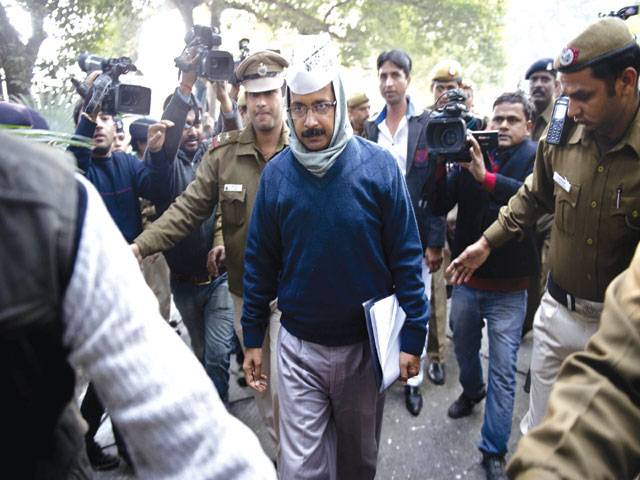Ajay Jha - The leader of India’s newest political outfit, Aam Aadmi Party, has given hope to masses of changing the country’s corruption-ridden system
India’s faltering ruling Congress party will eternally regret throwing down the gauntlet at a diminutive frail-looking man, without realising that his small frame holds the biggest threat the 128-year-old party could face. They challenged Arvind Kejriwal to contest elections to prove that he represented masses. A street fighter that Kejriwal was until then responded in style by launching his own political bandwagon named Aam Aadmi (common man’s) Party (AAP).
They laughed at him when he nominated himself to take on an invincible three-time winner, Delhi chief minister Sheila Dikshit, terming the contest from New Delhi assembly constituency as a fight between David and Goliath. And true to the definition, Kejriwal demolished the giant Dikshit and in the process created the biggest-ever scare for the Congress party — with less than 20 weeks left for the next general elections in the country.
Born into a middle-class Haryana family on August 16, 1968, Kejriwal was a normal, studious, next-door boy, but with a rebellious mind that would not take no for an answer. He made the cut for the tough entrance test to the elite Indian Institute of Technology and passed out as a qualified mechanical engineer. Getting a job in Tata Steel is the dream of any raw engineer, but a restless Kejriwal quit the job within three years.
His quest to change the system led Kejriwal to try his luck with the Indian Administrative Services — the assembly line for India’s top bureaucrats. He cleared the highly-competitive civil services entrance examination and joined the Indian Revenue Service where he worked as the joint commissioner of Income Tax. Here again Arvind worked only for five years, took a long study-leave, returned to the job briefly, only to quit it in 2006.
While still working in the Income Tax Department in New Delhi, Kejriwal started toying with an experiment called ‘change begins with small things’. He started a movement called parivartan (change) to assist citizens who faced problems in filing Income Tax returns or faced problems relating to electricity or ration cards, before starting the much-talked-about movement for enactment of the Right to Information Act, which he used to the hilt to expose corruption. His activism, termed as an effort to empower poor citizens, was recognised as he was awarded the prestigious Ramon Magsaysay Award for Emerging Leadership in 2006.
One may say on hindsight that the Magsaysay jury saw the potential in Kejriwal much before others in India did. Today, after vanquishing Dikshit to what may turn out to be her political extinction, Kejriwal can truly be termed as the most prominent emerging leader of India.
Kejriwal is both ambitious and stubborn. The only thing one can say against him is that he used veteran Gandhian Anna Hazare to fulfil his political ambitions. While Hazare had been fighting against corruption in his home state Maharashtra with impressive results for long, Kejriwal made common cause with him and floated India Against Corruption. He forced the veteran to shift the stage to New Delhi. On August 16, 2011 (which just happened to be Kejriwal’s birthday), Hazare started an indefinite fast at New Delhi’s Jantar Mantar with a handful of supporters. The event will be seen by future historians as the turning point in contemporary Indian history as the small protest demanding a Jan Lokpal Act, which the duo felt would weed out corruption from India, spread like viral. The crowd started growing in size and demand started growing louder and shriller as the movement spread to all parts of the country. The government was forced to send its emissaries to request Hazare to end his fast, which he did.
And this was when one of the emissaries, who happened to be a cabinet minister at the centre, identified Kejriwal as the brain behind Hazare’s agitation and threw down the gauntlet at him.
Repeated attempts to undertake fasts failed to yield the desired results and the anti-corruption legislation got stuck in political quagmire. Kejriwal decided that corruption could be fought only by entering into the system and converting India Against Corruption into a political party. Hazare did not agree and the two parted ways. Kejriwal launched AAP last year and within a year surprised everyone by just falling short of forming the government in Delhi.
Whether Kejriwal used Hazare or helped him make a household name in the entire country is a subject for debate. What is beyond debate is that he has emerged as a power to reckon with. Many feel AAP can do a Delhi in entire India come next general elections.
Only if Hazare – who is back to his fasting ways in his home state for the same cause – joins hands with his protege, the ensuing general elections can become a contest between Modi (the principal opposition Bharatiya Janata Party’s prime ministerial candidate) versus Kejriwal.–Gulfnews.com
Thursday, April 18, 2024
Small frame, big fame

Stefanos Tsitsipas advances in Barcelona
4:19 PM | April 18, 2024
Met Office predicts more rains across country till April 29
2:51 PM | April 18, 2024
Punjab changes school timings for summer season
1:55 PM | April 18, 2024
Enemies of Pakistan are unable to digest investment in the country: Ataullah Tarar
1:29 PM | April 18, 2024
IHC restores Bushra Bibi's appeal for shifting to Adiala Jail from Bani Gala
1:24 PM | April 18, 2024
Hepatitis Challenge
April 18, 2024
IMF Predictions
April 18, 2024
Wheat War
April 18, 2024
Rail Revival
April 17, 2024
Addressing Climate Change
April 17, 2024
Justice denied
April 18, 2024
AI dilemmas unveiled
April 18, 2024
Tax tangle
April 18, 2024
Workforce inequality
April 17, 2024
New partnerships
April 17, 2024
ePaper - Nawaiwaqt
Advertisement
Nawaiwaqt Group | Copyright © 2024





